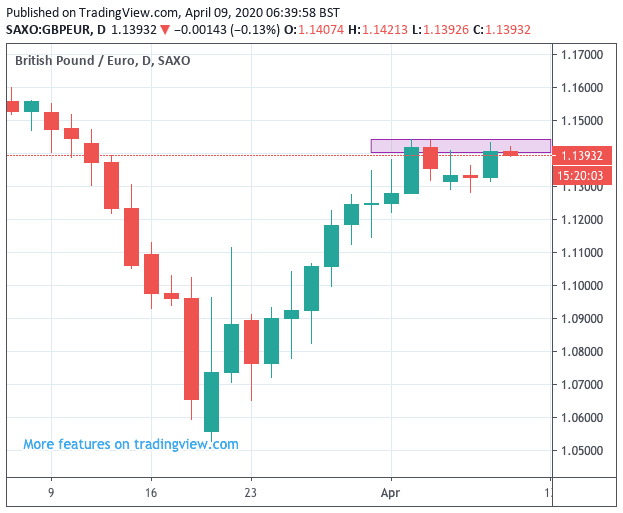Pound-Euro Exchange Rate Looks to Break Above Key Level, Johnson's Health said to Improve
- GBP/EUR remains well supported
- Johnson's health improves
- GBP/EUR finds resistance at 1.14 hard to crack
- EUR struggles amidst Eurozone disagreement on coronabonds

Above: Boris Johnson. © Pound Sterling Live
Pound Sterling recovered ground against the Euro over the course of the past 24 hours amidst news the condition of the UK Prime Minister's health is gradually improving and Eurozone nations were unable to agree a unified fiscal response to the coronavirus crisis.
Despite the gains, the Pound-to-Euro exchange rate appears to have met a solid layer of resistance around the 1.14 mark which is halting any meaningful upside and we would look for a decisive break above this level to open the door to further gains.
We are not confident that the kind of impetus required to prompt a break above the resistance zone, noted in the above graphic, will be provided today owing to the commencement of the long Easter weekend, however we would be wary of any heightened volatility that would arise from thinner-than-usual market conditions.
The British Pound has this week shown itself sensitive to news of the worsening health of Prime Minister Boris Johnson owing to his coronavirus infection; the currency fell on Tuesday night when it was revealed he had been admitted to the ICU unit at St. Thomas Hospital.
However, the currency was spared any further anxieties through the mid-week trading session on news that the Prime Minister remains stable and his temperature had fallen.
"Sterling steadied as it largely held a vigil for updates on the condition of British Prime Minister Boris Johnson. Mr. Johnson has been in the hospital since Sunday and in the ICU since Monday when his coronavirus symptoms took a turn for the worse. The latest reports indicated that the prime minister was in stable condition. The pound could be saddled with political upheaval if Mr. Johnson’s condition should further worsen, given the lack of constitutional roadmap for a successor should he need to be replaced," says Joe Manimbo, Senior Market Analyst at Western Union.
Johnson has now spent three nights in intensive care, a No. 10 spokesperson told the press the Prime Minister "continues to make steady progress".
Rishi Sunak, the Chancellor of the Exchequer, meanwhile said at the Government's daily press briefing that Johnson "has been sitting up in bed and engaging positively with the clinical team".
![]() - Spot GBP/EUR rate at time of writing: 1.1390
- Spot GBP/EUR rate at time of writing: 1.1390
- Bank transfer rates (indicative): 1.1090-1.1170
- FX specialist rates (indicative): 1.1230-1.1290 >> More information
The Euro is meanwhile finding little bidding interest over the ongoing impasse between Eurozone nations over the finding of an agreement for a unified borrow-and-spend programme to deal with the economic fallout from the coronavirus crisis.
Europe's single currency lost further ground after a 14-hour meeting of Eurozone finance ministers failed to produce an agreement supporting a common fiscal response to the coronavirus crisis which will impose a heavy cost on Europe's economies.
Foreign exchange markets were looking for a joined-up approach to be adopted that would see all Eurozone member states share the cost of a concerted response, an outcome that would have boosted the Euro.
"The euro pared a weekly gain on disappointment over Europe struggling to agree to an emergency aid package to dampen the economic blow from the coronavirus. European finance ministers are expected to resume talks on an aid package Thursday. The sticking point for nations like Italy and the Netherlands is over the conditionality of the emergency lending measures. Failure to reach a deal this week could catalyze a bout of euro selling ahead of the long holiday weekend," says Manimbo.
In particular, the establishment of a coronabond was being sought by hard-hit nations such as Spain and Italy but the sharing of debt that such a bond entails has been rejected by the likes of the Netherlands, Germany and Austria.
"It is disappointing, but not altogether surprising, that European finance ministers are struggling to agree on a fiscal package to support the euro area economy through this crisis," says Marchel Alexandrovich, Senior European Economist at Jefferies International. "Ultimately, the bulk of the burden of costs related to the pandemic will remain with the national governments and the standoff on common debt issuance and pooling of risk between the richer and poorer euro area countries is seemingly no closer to being resolved."
The support offered by national governments to their economies in order to soften the blow of the coronavirus crisis will mean German debt increases by 8.4% to end the year at 76% of GDP, according to numbers from Jefferies International.
However, Italy will grow their debt pile by 12.9% and see their debt relative to GDP balloon to 151%, the highest debt burden of any major European nation.
Spain would meanwhile see its debt pile grow 12.1% to 112% of GDP.
The imbalances make it clear as why some heavily indebted countries would want to pass on some of the extra burden to lower-debt countries, while those lower-debt countries would naturally resist the idea.
While a coronabond will likely remain elusive, Jefferies expect that agreements at the European level will include a raft of measures centred around some combination of a so-called “SURE” fund proposed by the EU Commission to help the unemployed, an initiative led by the European Investment Bank to help provide assistance to the corporate sector, and an agreement that any country in need can apply for a credit line to the ESM – with the money on offer being as much as €500bn (4.2% of euro area GDP).





